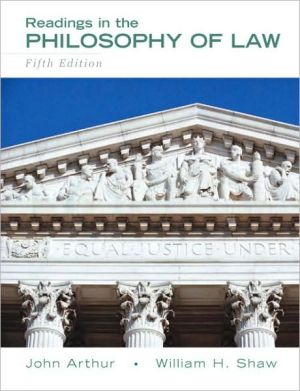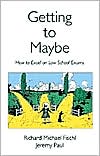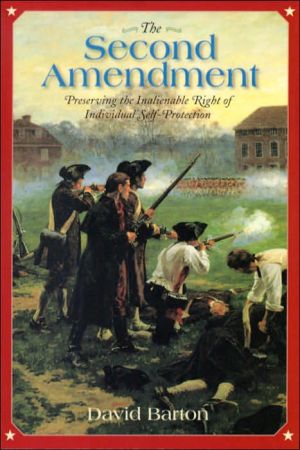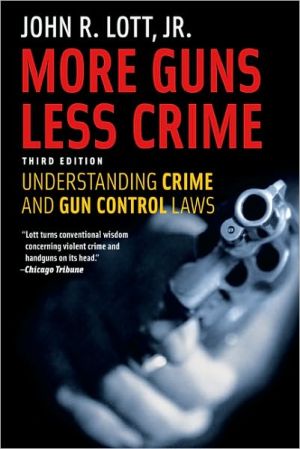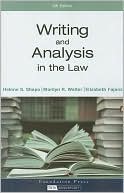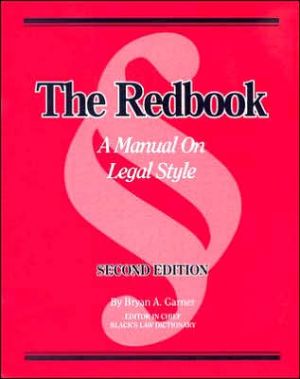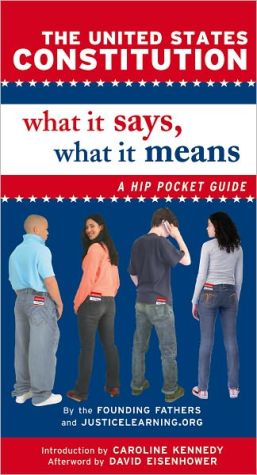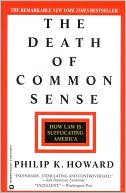Readings in the Philosophy of Law
This anthology of classical, contemporary, philosophical and legal essays/cases focuses on legal philosophy as its own subject—rather than being a part of social/political philosophy or applied ethics. The essays within this reader focus on how law is organized and the particular philosophical issues that it raises. The book requires students to think through actual debates–many of them still currently in the courts.
Search in google:
This anthology of classical, contemporary, philosophical and legal essays/cases focuses on legal philosophy as its own subject—rather than being a part of social/political philosophy or applied ethics. The essays within this reader focus on how law is organized and the particular philosophical issues that it raises. The book requires students to think through actual debates–many of them still currently in the courts. Booknews Through philosophical and legal essays and an array of legal cases, this collection of readings for an undergraduate course surveys the main philosophical questions concerning law and provides readers with basic conceptual and theoretical tools for analyzing and debating those basic issues. This revised edition (first was 1984) takes account of recent theoretical developments (such as critical legal studies and feminist legal scholarship) and currently controversial issues (such as hate speech and racial bias in sentencing). No index. Annotation c. Book News, Inc., Portland, OR (booknews.com)
PREFACE: \ PREFACE\ We have been gratified by the reception that the first two editions of Readings in the Philosophy of Law have received. Each edition went through several printings, and many friends and colleagues have written to offer comments and suggestions. Like its predecessors, this new edition reflects the conviction that legal philosophy is its own subject, best approached by paying attention to how the law is organized and to the particular issues it raises. The book is, therefore, not a book in applied ethics, nor one in political philosophy; it is its own subject with its own fascinating set of problems.\ This text can be used in many different ways. It is designed so that each section stands on its own, enabling instructors to address the topics in any order and to skip certain topics if they wish. Readers familiar with the earlier editions will find in the third edition much continuity in the themes and issues treated. Believing it to be the soundest organizational structure, we continue to follow the traditional divisions among different fields of law. Initial sections on legal practice, legal reasoning, and the nature of law are followed by discussions of criminal, tort, contract, property, and constitutional law. These make up the major subdivisions in the book.\ We have also expanded and redefined the early sections to deal with an array of topics either ignored or inadequately covered in other texts. In particular, we found it useful to begin undergraduate courses in philosophy of law with discussions of legal practice, the adversary system, the rule of law, obedience to law, and legal reasoning. Many philosophy of lawstudents plan to attend law school, so these topics are a natural way to introduce them to the subject. We have been especially careful in selecting this introductory material to use readings that are accessible and interesting to discuss. The introductory section, "The Practice of Law," brings together four widely different viewpoints on the role and responsibilities of lawyers in an adversary system, while the readings on the rule of law focus on the practical problem of how to deal legally with people who worked with a previous, Nazi-like regime.\ Readers will also notice many other new topics and essays in this edition. Part II, "The Nature of Law," now includes greatly expanded discussions of "Law and Economics" as well as "Critical Legal Theory and Feminist jurisprudence." Material on criminal law now includes an essay on the O. J. Simpson trial, jury nullification, and racial politics, along with readings on the battered woman's defense and the cultural defense in criminal cases. Part V, on constitutional law, has also been revised and expanded. It now includes more focused discussions of the justification of judicial review and the nature of constitutional interpretation, as well as an essay comparing the American understanding of constitutionalism with that of the French and British. We have added an essay and cases on religious freedom. The last section, "Equality and the Constitution," begins with two new essays on the ideal of equality itself; it also includes new cases on sexual harassment and hate speech.\ While seeking to present the readings in a coherent and interrelated format, we have at the same time sought to provide a textbook with ample resources to allow a variety of different courses to be taught, in different ways, and to different student audiences. These and related editorial decisions grow out of our experience in teaching courses in philosophy of law at several colleges and universities, both private and public, to undergraduates with varying degrees of philosophical background and academic preparedness. One of us teaches philosophy of law to more than two hundred mainly lower-level students each year.\ Philosophy of law is not a subject that can be made simple, but it can be made more accessible and more engaging to undergraduates than it has been in the past. Accordingly, we have endeavored to provide readings that students will find stimulating, yet that do justice to the subtlety and complexity of the philosophical problems in this field. We provide short introductions before each reading selection, and questions for review and discussion after each selection. These should enable even beginning students to follow the major arguments, at least in broad outline. In addition, we have edited the essays and cases with great care and abridged many of the readings from the previous edition in order to keep the focus sharply on the most relevant and important issues, avoiding needless technicality, immaterial digressions, and recondite issues.\ John Arthur\ William H. Shaw
1The adversary system and the practice of law1Lawyers' ethics in an adversary system2An alternative to the adversary system10Building power and breaking images : critical legal theory and the practice of law12The lost lawyer172The rule of law24Magnitude and importance of legal science24Eight ways to fail to make law27Grudge informers and the rule of law32The problem of the grudge informer33The rule of law and its virtues383The moral force of law45Crito45The justification of civil disobedience50On not prosecuting civil disobedience574Statutes65On interpretation : the adultery clause of the Ten Commandments65Interpreting the Small Bird Act68Regina v. OjibwayA case study in interpretation : the Mann Act69Cases interpreting the Mann Act74Caminetti v. United States; Mortensen v. United States; and Cleveland v. United StatesInterpretation80Who is a drunk driver?84Kentucky v. WhittWhat is a vegetable?85Nix v. HeddenCan a murderer inherit?86Riggs v. Palmer5Precedents91Reasoning by analogy91Stare decisis : the uses of precedent93Rape, consent, and "mens rea"102Regina v. MorganPrecedent and legitimacy105Planned Parenthood v. Casey6Classical perspectives111Traditional natural law theory112Summa theologica116Blackstone's commentaries121The province of jurisprudence determined1267Formalism and legal realism132The system of law132The path of the law135Realism and the law1398Morality and the law147Positivism and the separation of law and morals147Law as the union of primary and secondary rules155The model of rules161Natural law revisited170The dependence of morality on law1769International law182International law182The African slave trade187United States v. La Jeune Eugenie; The antelope; and The AmistadInternational law and individual responsibility192The International Military Tribunal at Nuremberg10Theories about law198The economic approach to law198Law and economics : an analysis and critique209Critical legal studies213Jurisprudence and gender220Critical legal studies and Dworkin231Skepticism, objectivity, and democracy23811The justification of punishment245Who should be punished?245The case of the dog ProvetieThe utilitarian theory of criminal punishment246Persons and punishment252The moral education theory of punishment259Restitution : a new paradigm of criminal justice26312The rights of defendants269Criminal justice and the negotiated plea269Convicting the innocent276The Dirty Harry problem284A debate on the exclusionary rule292Interrogation and the right to counsel302Miranda v. Arizona; Brewer v. Williams; and Rhode Island v. InnisEntrapment317United States v. Tobias13Sentencing324Capital punishment324Gregg v. GeorgiaElectric shock : the fairest punishment of all331"Three strikes"335Rummel v. EstelleRacial bias in sentencing339McClesky v. Kemp14Criminal responsibility342Survival on a lifeboat342The Queen v. Dudley and StephensThe principles of criminal law347Intention352Attempting the impossible : the crime that never was358The battered woman syndrome365State v. LeidholmRape, force, and consent368Is the insanity test insane?375What is so special about mental illness?383The "rotten social background" excuse390United States v. Alexander and MurdockExecuting mentally retarded murderers395Atkins v. Virginia15Compensating for private harms : the law of torts403The efficiency of the common law404Negligence408Economic efficiency and the "hand formula"414United States v. Carroll Towing CompanyForeseeable risk415Stone v. BoltonTort liability and corrective justice418Negligence and due care425Palsgraf v. Long Island Railroad CoLoss, agency, and responsibility for outcomes432Liability without causation?436Summers v. TiceLegal causation and the desert traveler439A duty to rescue?450Yania v. Bigan; Farwell v. Keaton; and McFall v. ShimpWrongful life and wrongful birth454Berman v. Allan16Private ownership : the law of property461Property461Property and sovereignty466Intellectual property472Property acquisition478Haslem v. LockwoodRegulation of private property482Pennsylvania Coal Co. v. MahonTaking without compensation485Penn Central Transportation Co. v. New York City17Private agreements : the law of contract490The basis of contract490Contract as promise497Unconscionable contracts505Williams v. Walker-Thomas Furniture CoSurrogate mother contracts507In the matter of Baby MEmployment contracts515Lochner v. New York; Muller v. Oregon; Coppage v. Kansas; and West Coast Hotel Co. v. Parrish18Constitutionalism and democracy523The Federalist Papers524The political meaning of constitutionalism : British, French, and American perspectives530The notion of a living constitution545Constitutional cases546Democracy, judicial review, and the special competency of judges55519Freedom of religion, privacy, and speech565A letter concerning toleration565School prayer569Religious freedom and public education573Wisconsin v. YoderSecular humanism and religious establishment576Smith v. Board of Education of MobileOn liberty579The right to privacy585Griswold v. ConnecticutHomosexuality and the right to privacy589Lawrence v. TexasGay marriage596Goodridge v. Massachusetts Department of Public HealthJudicial activism and gay marriage : a debate605Of the liberty of thought and discussion608Flag burning612Texas v. JohnsonNazi marches615Village of Skokie v. National Socialist PartyObscenity619Paris Adult Theatre v. SlatonPornography and women621American Booksellers v. HudnutCampus speech codes624Doe v. University of Michigan20Equality629Wartime internment of Japanese Americans629Korematsu v. United StatesRacial equality and affirmative action634Affirmative action in universities641Grutter v. BollingerGender discrimination646Michael M. v. Sonoma County Superior CourtSpeech creating a "hostile environment"648Harris v. Forklift SystemsAppThe Bill of Rights and the Fourteenth Amendment651
\ BooknewsThrough philosophical and legal essays and an array of legal cases, this collection of readings for an undergraduate course surveys the main philosophical questions concerning law and provides readers with basic conceptual and theoretical tools for analyzing and debating those basic issues. This revised edition (first was 1984) takes account of recent theoretical developments (such as critical legal studies and feminist legal scholarship) and currently controversial issues (such as hate speech and racial bias in sentencing). No index. Annotation c. Book News, Inc., Portland, OR (booknews.com)\ \
